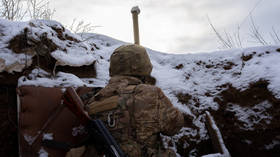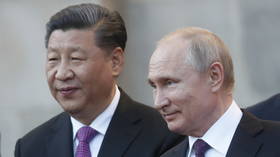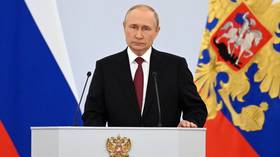Timofey Bordachev: Western hegemony is coming to an end, and the world is about to enter a very dangerous period
For 500 years the world has been run from Europe or the US: that’s about to change and nobody is sure what its replacement will look like

The most dramatic and unique aspect of the current state of affairs in international politics is that we cannot count on the ability of a single state, or a group of sufficiently powerful countries, to play a leadership role in the future.
This means it is difficult for us to imagine who will be able to force states to comply with the rules of conduct in their foreign policy, and how such strictures can even be enforced.
Indeed, the question of why individuals, or in this case countries, should abide by regulations is the most fundamental one in political philosophy. And despite all the imperfections of the power method, humanity has not yet invented any other way of achieving such goals, even in minimal amounts, other than by force.
Over the last 500 years, the rules of international communication have been created within the narrow community of Western countries, first in Europe, before in the 20th century the US joined in, providing the power needed to enforce the system.
At first, this was done through the balance of power of leading European states, joined by Russia in 1762. After the international order that had emerged in the mid-17th century came under attack from revolutionary France, control of the rules became a matter for a small group of major empires. They, led by Russia and Britain, defeated Napoleon and in 1815 created an order which had at its heart a general agreement that mutiny in international affairs was unacceptable.
By the end of the nineteenth century, politics had become global, but the European powers, including Russia, could still control the rest through brute force and their colossal military-industrial superiority. The dramatic events of 1914-1945 brought the US to the forefront of global politics, as the leader of the Western community on a global scale.
International institutions, starting with the United Nations, were established with the primary objective of preserving the monopoly position of the West. This, however, required the emergence of formal institutions of justice in the form of international law, or the participation in the highest UN body, the Security Council, of the Soviet Union and China, which were inherently hostile to US and Western European interests.
The institutional form of Western power dominance has become overbearing and the main question now is whether it can be preserved. Therefore, the collapse of US and Western European power positions in international politics entails not just a change of leadership, but a revision of the existing institutions and rules at the global level.
In other words, the entire formal international order that has emerged after World War II (and in reality over the last few centuries) will cease to exist.
It was based on a special system of rights and privileges for a limited group of great powers, and later the illusion of fairness of which was created by international institutions led by the UN. It was this system that played the role of the main legitimizing principle of the existing world order, although in practice it was often replaced by the West's ability to exert a decisive influence on world affairs.
Thus, the collapse of international political institutions will very probably prove to be a consequence of the disappearance of their power base, whose presence has been unchallenged for several centuries. We are now witnessing the destruction of both the formal and the real basis of the international order. In all likelihood, this process can no longer be stopped.
The coming period will be a time of defining the new global power base, and it is difficult to say yet which players, and to what extent, will become part of it.
What is important is that the top states of the present time – the US, Russia, China and India – are not close to each other, especially in terms of values and understanding of the basic principles of international rules. The greatest problem so far is the behaviour of the US and certain Western European countries, which, for internal reasons, are pursuing an aggressive policy towards the outside world.
These states have embarked on a very troubling path of qualitative changes in the basic things that make up the social, gender and, consequently, political structures of society. For most other civilizations, this path is a challenge and will be rejected.
We also do not know the extent to which the internal development of the West depends on the spread of its ideals, as it did in previous periods. In the event that the trends emerging in the West will, like revolutionary France, the Bolshevik regime or Nazi Germany, demand not just recognition from others, but expansion globally, the future will become very worrying.
We can already see that the conflict between the values favored by the West and the foundations of domestic legitimacy in a number of countries, is becoming a ground for aggravated political relations.
It would, however, be a mistake to hope that the other great and middle powers confronting the West are completely united in their understanding of the foundations of justice at the domestic level. Even if Russia, India, China or Brazil now demonstrate a common understanding of the basic principles of a “proper” world order, this does not mean that they have the same vision of a better domestic order.
This is all the more true of the states of the Islamic world and other major developing countries. Their conservative values are often in conflict with those of the West, but this does not mean that they can create unity between themselves.
In other words, the new international order will, for the first time, be without a reliable link with the domestic ambitions of the leading powers, and this is indeed a qualitative change compared to all the historical eras we discussed. Such a phenomenon seems very important because we have no experience of understanding how relations between states will develop under such conditions.
Brute force could become the only relatively tangible basis to assert the order, but this may not be enough to make the conditions imposed by it sustainable, even in the short term.
Another unique feature of today's revolutionary situation is that the revision of the international order is not being carried out by one or a few powers – it has now become the business of the world’s majority. The countries that make up about 85% of the world's population are in one way or another no longer prepared to live with conditions created without their direct involvement. That said, their resistance is often expressed without direct intention and depends on the power capabilities of the particular power.
What from the point of view of Russia or Iran looks like lack of resolve in dealing with the US may seem like a great challenge for Kazakhstan or another young sovereign country – after all, their entire socio-economic system was created to exploit a liberal world order.
The fragile states of Africa, or the former Soviet space, are far less capable of behaving consistently than the prosperous monarchies of the Persian Gulf. China, though now the second most powerful economic power, is also aware of its weaknesses. But all this does not change the most important thing - even if the destruction of the existing status quo takes the form of soft sabotage rather than decisive military action, it does not simply reflect a general discontent with Western authoritarianism, but creates a new order, and the basic features of this are as yet undetermined.
In the coming years, most countries in the world will seek to make the most of the weakening of the power base of international politics in their self-interest. So far, these actions constitute a constructive conflict, since they objectively undermine a system based on fantastic injustice.
However, as time goes on the US-EU bloc will weaken and lock itself away, and Russia or China will never be strong enough to take their place. And in the perspective of the next 10 to 15 years, the international community will face the problem of replacing the power monopoly of the West with new universal instruments of coercion, the nature and content of which are still unknown to us.
https://www.rt.com/russia/565523-timofey-bordachev-western-hegemony/





0 Comments:
Post a Comment
Subscribe to Post Comments [Atom]
<< Home